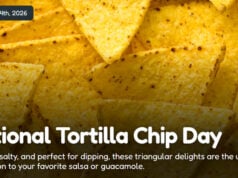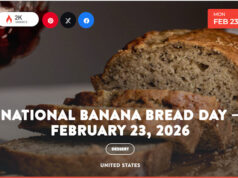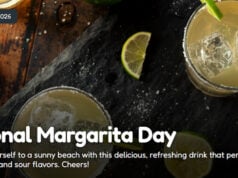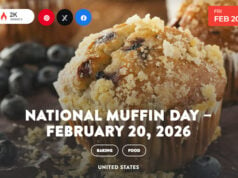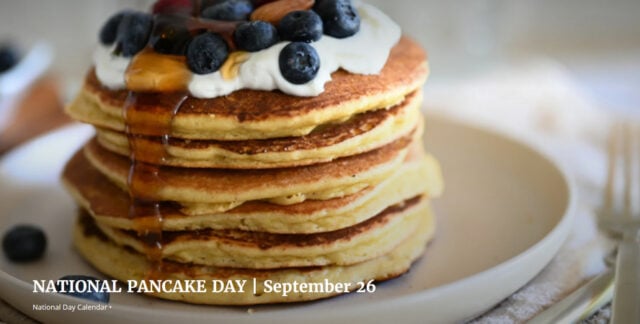
National Pancake Day on September 26th sets up a tall stack of syrupy goodness to celebrate! Set the table. Mix up the batter. Heat up the griddle. Because the butter is ready to melt and the flapjacks are delicious!
- 30,000 years ago – Also known as Johnnycakes, griddle cakes or hotcakes, this batter-made breakfast item dates back more than 30,000 years. It may be the oldest breakfast food in history.
- Circa 1200 BC – The Ancient Greeks made pancakes called τηγανίτης (tēganitēs), ταγηνίτης (tagēnitēs) all words deriving from τάγηνον (tagēnon), “frying pan”.
- 600 AD – When Pope St. Gregory prohibited Christians from eating meat as well as animal products (such as eggs, butter and milk), Shrove Tuesday began as a final hurrah and a way to use up the ingredients left in the house. For Christians in England, this translated into making pancakes
- 753 AD – it was believed in Medieval times that the first three pancakes cooked were sacred. They were each marked with a cross before being sprinkled with salt and then set aside to ward off evil.
- 15th Century – The first pancake recipe appeared in an English cookbook in the fifteenth century.
- 1445 – The town of Olney in England hosts an annual pancake race in celebration of “Pancake Day.” They’ve done it every year since 1445
- 17th Century – In celebration of the day, many people from communities leave their houses and join together to play a match of rudimentary football on the road or in the public square. The tradition mostly dies out after 200 years, but a few towns still participate in modern times.
- 1611 – According to the Oxford English Dictionary, “flat as a pancake” has been a catchphrase since at least 1611.
- 1889 – The first ready-mix food sold commercially was Aunt Jemima pancake flour. The brand name was retired in 2021 and is now known as the Pearl Milling Company
- 1903 – In the town of Scarborough, UK, the children and workers are given a half-day off for Pancake Day. They celebrate by playing games on the beach (including skipping), and a festive atmosphere is created as stalls are set up to sell toys and trinkets
- 1950 – Olney, UK, and Liberal, Kansas, USA, begin competing to see who has the best time on a Pancake Day race. Courses are marked out and participants time to see which town wins each year. The race still continues in the present with Liberal leading Olney 38-31 at last count.
- 2024 – The United States produced 5.86 million gallons of maple syrup.
- Pancakes are also known as Johnnycakes, griddle cakes or hotcakes.
- It became a traditional part of Fat Tuesday (Shrove Tuesday) celebrations when revelers would feast before fasting. They still do! The thin cakes can be rolled and filled with fruit and other fillings. Usually, though, they’re stacked and drizzled with flavored syrup.
- Maple syrup, often used as a pancake topping, was originally a sweet drink that was discovered by the Algonquin Indians.
- It is common in France to touch the handle of the frying pan and to make a wish while the pancake is turned, holding a coin in one hand.
- William Shakespeare liked pancakes, often mentioning them in his plays.
- In Sweden, you can order Blodplattar, which are pancakes made from pork blood.
- Pancakes outnumber the waffles five to one.
- Pancake average calories: 80 calories without a topping.
- Britain will eat an eggstraordinary 52 million eggs on Pancake Day.
- 75% of people don’t know the ingredients needed for the basic pancake mix!
- One in ten people over 55 has never made a pancake!
- The French crêpe is thin and crispy. It is folded or rolled and heated in a sauce of sugar, butter, citrus juice and liqueur.
- In the United States, southerners eat the most pancakes, accounting for 32.5% of the pancake consumption.
- In Canada and the United States, pancakes are often eaten for breakfast with butter and syrup.
- Blinis are yeasted pancakes, usually from Russia, that are made from buckwheat flour and served with sour cream, jam, honey, or caviar.
- The potato pancakes that are traditionally served during Hanukkah are fried in oil as a reminder of the miraculous oil lamp that the Jewish holiday celebrates.
Sources:
Disclaimer
Artificial Intelligence Disclosure & Legal Disclaimer
AI Content Policy.
To provide our readers with timely and comprehensive coverage, South Florida Reporter uses artificial intelligence (AI) to assist in producing certain articles and visual content.
Articles: AI may be used to assist in research, structural drafting, or data analysis. All AI-assisted text is reviewed and edited by our team to ensure accuracy and adherence to our editorial standards.
Images: Any imagery generated or significantly altered by AI is clearly marked with a disclaimer or watermark to distinguish it from traditional photography or editorial illustrations.
General Disclaimer
The information contained in South Florida Reporter is for general information purposes only.
South Florida Reporter assumes no responsibility for errors or omissions in the contents of the Service. In no event shall South Florida Reporter be liable for any special, direct, indirect, consequential, or incidental damages or any damages whatsoever, whether in an action of contract, negligence or other tort, arising out of or in connection with the use of the Service or the contents of the Service.
The Company reserves the right to make additions, deletions, or modifications to the contents of the Service at any time without prior notice. The Company does not warrant that the Service is free of viruses or other harmful components.




